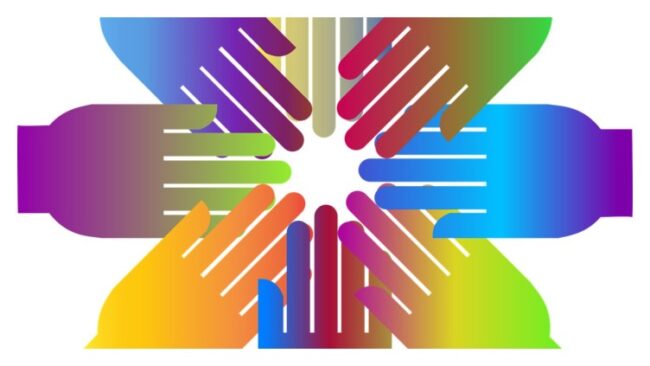The health and wellness sector continues to grow. There are retreats, self-help books and tools, gratitude practices, mindfulness techniques, and so many methods and products that promise a healthier happier life, I can’t begin to count them all. Yet at the same time, suicide rates are at an all-time high, domestic violence and abuse continues to be a growing problem and our young people are reporting the highest rates of anxiety and depression of any generation so far. Something needs to change. As employers we are in a strong position to create a change, but like any behaviour shift, it must start with ourselves. But how?
If our businesses thrive on sustained, productive, effective performance and the ingredients to achieving that are in the vein of clarity, connection, results, learning, what is the missing piece? For me, the answer is always in the dialogue and the ingredient is kindness. This is where nurture lives. Without nurture, we might survive, but we won’t thrive. In a working context, it translates into unexplored and untapped potential. Without kindness in play, organisations miss out on more than productivity. They lose discretionary effort. The compounding effect of the loss of creativity, innovation and progress eats away at the opportunity to achieve organisational goals and the legacy they aspire to create.
So, what’s so tricky? There’s a causal pathway to a kind and compassionate dialogue. That’s what makes it easy to say and not so easy to demonstrate. To get to kindness we need to feel it. To feel it, we need compassion and empathy. If either of those is missing, we won’t be authentic. With a high focus on technology and results, it’s the perceived ‘soft’ skills that take a back seat when it comes to training. But the business case is becoming more and more evident in so many under-skilled managers being unable to make compassionate decisions that are clearly communicated. The question is, will we take time to invest in developing it? If so, where do we start?
The dictionary definition of kindness is “the quality of being friendly, generous, and considerate”. Here’s our take on what kindness is and how to develop it:
Kinship
Are you good to be around? To others? What about to yourself? When something goes well do you congratulate or criticise? When you talk about people, do you bring them down or pull them up? Look at the impact, not the intention. If you’re not sure, spend some time simply observing reactions for a month. Listening is a superpower. Make a diary of your observations, then review and see what trends / patterns emerge. When you’re speaking, notice the adjectives and phrases that you use frequently. Is it a helpful dialogue or is it harsh? Does it propel people forward or does it halt them in their tracks? Notice patterns in others and you’ll have data that no spreadsheet can provide. And there’s no better kinship that really hearing and seeing what’s important to someone.
If you’re not getting what you need, do you find ways to connect with others or hope someone else will notice? Assertive behaviour is important here. It’s about making sure everyone’s heard (enough) and considered (enough) before moving forward. Equally, what do you say to yourself, about yourself? If you’re a good friend to yourself, accepting of who you are and what you bring, you’ll be a more accepting, grateful colleague, friend, spouse, parent and so on.
Inspiration
Do you know who and/or what inspires you? Do you allow yourself to be inspired or do you surge forward every day with a list to achieve or perhaps you have a high need for external validation? In the workplace, do you help people find inspiration for themselves? Build a daily habit with as much importance as following your daily hygiene routine for getting absorbed in what inspires you. It could be as simple as watching the sunrise or listening to your favourite music. It doesn’t have to be attending a conference of motivational speakers, but if that’s what works, do that too!
Also, never underestimate how inspirational you might be to someone else. Do what you need to do, and the ripple effect could be significant for others.
Nurture
Do you allow time to restore your energy when it’s used? Physically, mentally, emotionally, spiritually? What do you purposefully do to keep your stress levels under control? Do you notice what’s helpful, useful, and act on it before a low or a breaking point? If you’re a manager, how do you encourage this for your people? How do you praise so you can reap the benefits of that great performance again in the future?
An important part of nurture is self-care. The basics in working life are so often missing. Poor nutrition choices, low activity levels, overuse of devices. If we don’t prioritise for ourselves, we can’t be fully available, sustainably, to the people / causes that matter to us. As an employer, it’s in everyone’s best interests to make it a part of our regular conversations with our employees and give support for healthy choices, and recognition for strong contribution. Often a simple thank you goes a miss. Ignore nurture and we’ll see it in low productivity, higher and more frequent disputes, increasing absence levels and more. So, it makes sense to proactively focus on the basics. And not just for today’s workforce. We’re on the receiving end of a multiplier effect, if we embrace a change now, we can create a positive multiplier for future generations. That’s the true sense of nurture for me. Imagine a generation whose internal dialogue is healthy, resilient and kind.
Dedication is a practice that breeds passion. I have often witnessed rigidity in methods and mindsets which simply stifle people and results. That’s not dedication. The highest performing teams have plenty of humour and discipline in good measure. A kind approach for individuals and teams is one that is firmly held, gently delivered, whatever the topic. Knowing what and when to invest in team resources is key to making sure they can deliver. Dedicate your leadership development to relationship building and communication skills and growth and sustainability will be a benefit, not a focus. Without dedication in human kindness, managers will quickly fall into the micromanagement trap, overly focused on tasks and will continue to be frustrated and reactive making them less likely to adopt a kind response when it’s most needed. For example, when a crisis hits, kind managers have higher emotional intelligence to gain commitment from their teams to pull through.
I must add that being dedicated doesn’t mean ‘peak productivity’ all the time and ‘perfect’ results always. I remember learning how professional athletes train at 80% so they can give 100% on race day. A kind approach i.e. if it’s inspiring, nurturing and based on kinship, will have realistic, stretching targets. And it can be measured easily with forgiveness. If you or someone else makes a mistake, do you allow the learning to emerge, the time for regrets to dissolve? Is your language helpful to yourself as well as others? For more on this see our next blog about the skills of learning through feedback! But I digress.
Whilst the increase in wellbeing programmes and workplace benefits will continue to be essential for today’s employers, I wonder, what’s the real take-up of these schemes? Are they accessed by the people who really need them? Are employers really driving the activity that will reap long term benefit? And even so, is the training investment in line managers enough to help them develop the core skills they really need to be productive business champions?
Organic P&O Solutions works with Thames Valley businesses to help people change the way they think and behave so organisations become more effective. We love creating teams who love working together through HR strategies and training programmes. If you’d like a confidential discussion about creating productive champions for your business, we’d love to hear from you.

